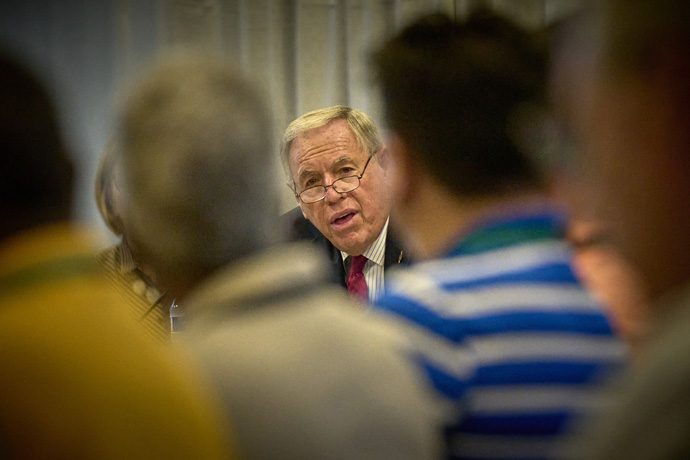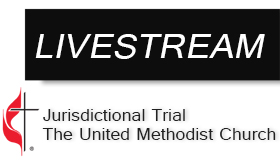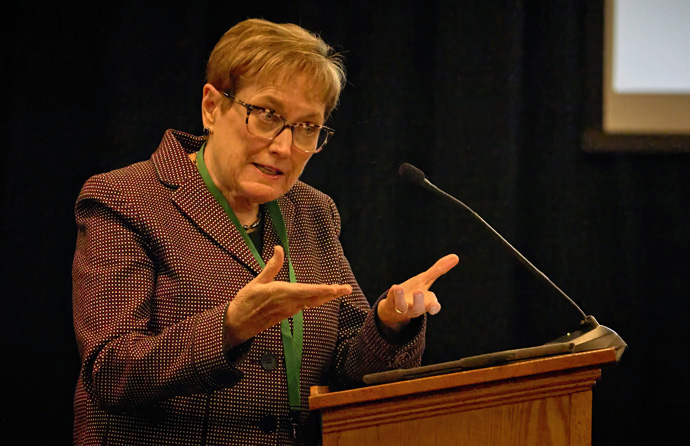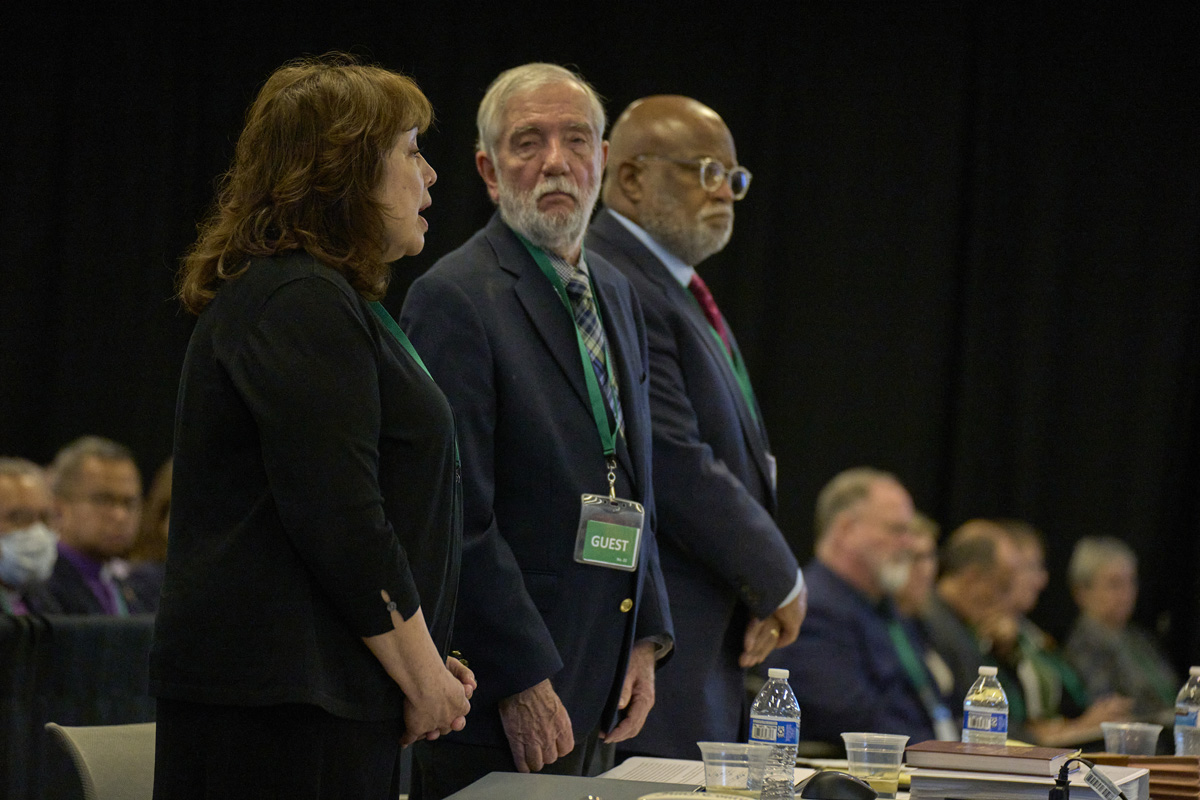Key points:
- Bishop Minerva G. Carcaño faces four charges of violating church law.
- She is accused of disobeying the order and discipline of The United Methodist Church, undermining the ministry of another pastor, committing harassment (including but not limited to racial and/or sexual harassment) and committing fiscal malfeasance.
- Carcaño pleaded not guilty to all four charges, which stem from complaints filed by members of the California-Nevada Conference.
For the first time in nearly 100 years, charges against one of The United Methodist Church’s bishops have gone to trial.
Bishop Minerva G. Carcaño faces four charges of violating church law. She is accused of disobeying the order and discipline of The United Methodist Church, undermining the ministry of another pastor, committing harassment (including but not limited to racial and/or sexual harassment) and committing fiscal malfeasance.
The announcement by retired Bishop Alfred W. Gwinn, the presiding officer in the case, marked the first public disclosure of the nature of the accusations she faces since March of last year when Western Jurisdiction leaders announced that Carcaño was under suspension while complaints against her were under review. She has been on leave with pay and benefits ever since.
Carcaño pleaded not guilty to all four charges. All four charges stem from three complaints filed against the bishop by members of the California-Nevada Conference.

As in the U.S. court system, the United Methodist judicial process operates under the principle that people are innocent until proven guilty.
However, Gwinn stressed that the proceedings of a church trial are different from that of a U.S. civil trial.
“In a church trial, we are guided not by federal and state laws, but by the church law of The United Methodist Church,” said Gwinn, who serves as an equivalent of a judge in the case. “And my role is to guide the process as defined by the Discipline.” The Book of Discipline is the denomination’s law book.
How to watch trial

The trial of the bishop began at 9 a.m. U.S. Central time Sept. 19 at the offices of Wespath Benefits and Investments in Glenview, Illinois, a Chicago suburb.
The United Methodist Commission on Archives and History initially found no record of a bishop’s trial in The United Methodist Church or its predecessor denominations. After months of searching, the commission has found a record of a prior church trial of a bishop. Bishop Anton Bast, then suspended from service in Denmark, faced such a trial in 1928.
The Western Jurisdiction — which encompasses seven conferences, or regional bodies, in the U.S. western states and territories — elected Carcaño as the denomination’s first Latina bishop in 2004. Prior to the trial, the jurisdiction handled the adjudication of the case. At Carcaño’s request, Gwinn agreed to move the trial to the North Central Jurisdiction, which encompasses 10 conferences in the U.S. Midwest.
That left the task of selecting the jury pool up to the North Central Jurisdiction’s bishops.
Jury selection
The trial’s morning session began with the selection of the 13 ordained clergy and two alternates in the North Central Jurisdiction to serve as the trial court, or jury.
The Book of Discipline requires the pool of potential trial court members to include at least 35 people, with care given to represent racial, ethnic and gender diversity.
The North Central Jurisdiction bishops initially nominated 45 clergy for the jury pool. Of those clergy, 38 were up for selection for the jury on Sept. 19. The remaining jury pool represented all 10 of the jurisdiction’s conferences, with 63% being people of color and 61% being female.
Ultimately, the presiding officer — in consultation with the counsels of both the church and Carcaño — whittled down the 38 nominees to the required 13 with two alternates, who also will observe the full proceedings. The jury remains anonymous and is not to engage in conversation or outside research about the case as the trial proceeds.
Even before they arrived for the trial, the potential jurors had already answered questions to gauge their impartiality. During the morning session, Gwinn asked all potential jurors if they had been subject to a complaint or had filed a complaint of a violation of church law. He also asked if their knowledge of witnesses or parties in the case would prevent them from fairly applying the law in this case.
Subscribe to our
e-newsletter
Opening arguments
The opening arguments in the trial offered details of the issues involved.
The case deals with three different complaints filed against Carcaño.
At heart, the case deals with the covenant of sacred trust that binds all ordained United Methodist clergy, said the Rev. Janet Forbes, a retired elder in the Mountain Sky Conference. She is the counsel for the church, or the equivalent of the prosecutor in the case.
“We ask you to decide this question: Where is that line in the breaking of sacred trust?’”
- In one complaint, Forbes said, the bishop is accused of practicing nepotism in supporting the hiring of her daughter as an administrative assistant of a district superintendent and then allowing her daughter to be provided with rent-free housing in a parsonage. The bishop is also accused of supporting the appropriation of $100,000 from the First St. John’s Fund, which is designated for church development in San Francisco, to be used for the parsonage’s renovation. The bishop told the cabinet that she also would reside in the parsonage to do strategic work in the San Francisco area.
- In the second complaint, the bishop is accused of interfering with the authority of the California-Nevada Conference board of trustees to make the ultimate decision on what to do with the valuable property of Trinity United Methodist Church in Berkeley, California.
- In the third complaint, the bishop is accused of denying a pastor 12 weeks of uninterrupted maternity leave required by the Discipline and then retaliating against this clergy member with a three-quarters-time appointment to her current church and only a quarter-time to a planned new church start.
“All three complaints share a common component of before and after,” Forbes said. “Things were stable, peaceful before the bishop’s leadership and decisions were questioned. Things were neither stable nor peaceful after her leadership and decisions were questioned.”

The Rev. Scott Campbell, counsel for Carcaño and a retired elder in the New England Conference, argued that the bishop’s actions did not rise to the level of a violation of church law, much less a reason to suspend a bishop.
“It was no transgression too horrible to name,” he said. He described the situation as the result of internal disputes within the conference.
“There was a dispute among conference officers over their authority in a church development project,” he said. “There was a quarrel about the hiring of a part-time administrative assistant to one of the district superintendents. There was a failure to have a meeting of the minds on who should approve a grant from a district trust fund to renovate a local church parsonage.”
He added that the conference leaders also experienced differences over how to best accommodate the needs of the church and those of a pastor concerning maternity leave. He said intervention by a district superintendent prevented the bishop from meeting in person with the pastor.
The charges against the bishop, he said, “simply won’t stand the test of careful reasonable examination by thoughtful, fair-minded people.”
UM News will have coverage of today’s witness testimony in its Sept. 20 report.
Hahn is assistant news editor for UM News. Contact her at (615) 742-5470 or newsdesk@umcom.org. To read more United Methodist news, subscribe to the free Daily or Friday Digests.




